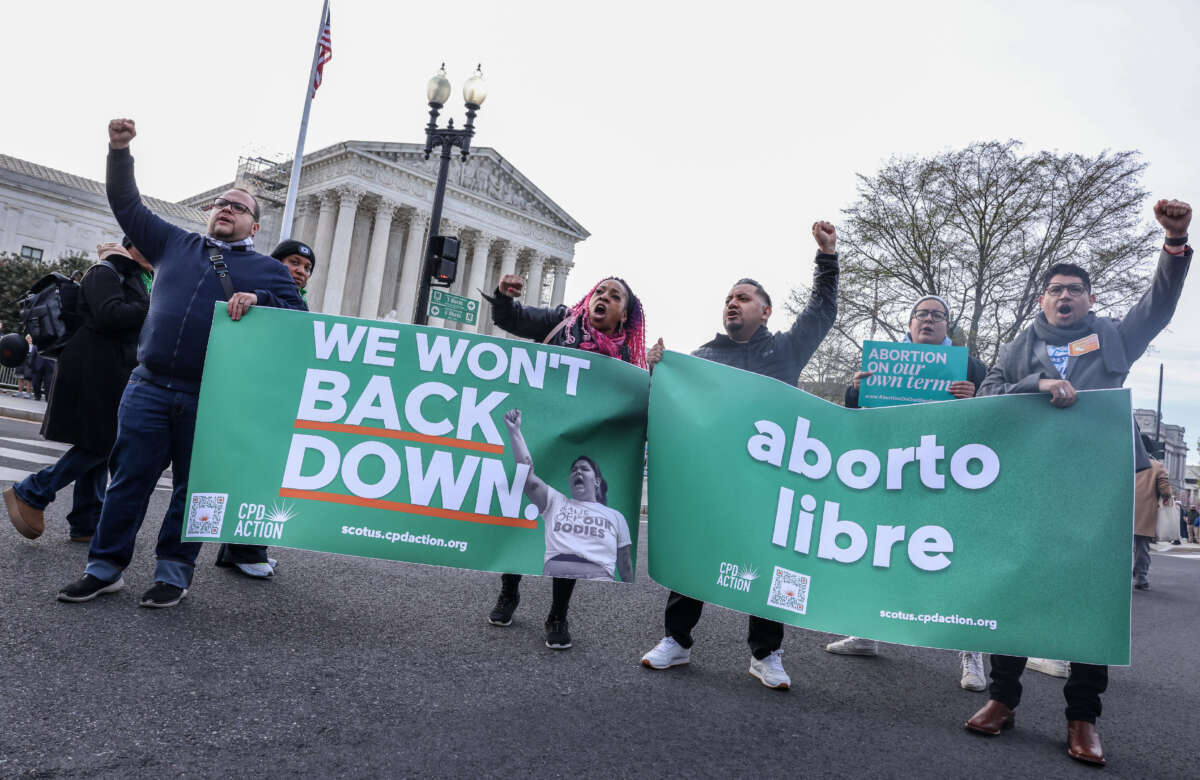Republicans across the country have blocked Democratic efforts to codify the right to use contraception.
By Mike Ludwig ,
March 26, 2024

Demonstrators gather in front of the Supreme Court during the "Bans Off Our Mifepristone" action organized by the Women's March, on March 26, 2024, in Washington, D.C.JEMAL COUNTESS / GETTY IMAGES FOR WOMEN'S MARCH
Today the Supreme Court hears oral arguments over whether to restrict access to the abortion medication mifepristone — a drug that became crucial for reproductive freedom after the court’s conservative majority threw out the right to abortion in 2022. Meanwhile, Republicans across the country are thwarting efforts by Democrats to enshrine the right to use birth control and other methods of contraception.
If the Supreme Court offers a broad ruling against Food and Drug Administration (FDA) approvals for mifepristone, such a ruling could invite further legal challenges to other medications that are used by millions of people but remain controversial on the right, including Plan B emergency contraception, birth control pills, vaccines and gender-affirming hormone therapy.
The Supreme Court is considering a challenge from an anti-abortion group of doctors to decisions made by the FDA in 2016 and 2021 to make abortion pills available for use at up to 10 weeks of pregnancy and allowing physicians to prescribe the medication remotely. Abortion medications are typically used at home and are considered a safe way to end early pregnancy by major medical associations. Anti-abortion idealogues are attempting to convince the Supreme Court otherwise.
The FDA approvals allowed patients to receive abortion pills in the mail, and now 63 percent of abortions in the U.S. are medication abortions. If the Supreme Court sides with the anti-abortion plaintiffs, the ruling could devastate mutual aid networks that help patients in states with abortion restrictions access the medication.
Many anti-abortion groups also oppose the use of contraceptives due to religious teachings and work to wrongly stigmatize drugs such as birth control and Plan B as a form of abortion. Legislation regularly introduced in red states would declare that life begins at the moment of conception, which is widely seen as the first step toward banning birth control and Plan B.
RELATED STORY

Supreme Court Will Hear Arguments Tuesday on FDA Mifepristone Approval Process
Lower courts in the case relied on anonymous internet blog posts and questionable witnesses to formulate their opinions.
By Chris Walker , TRUTHOUT March 25, 2024
Meanwhile, Republicans in Congress and multiple states have rejected Democratic legislation that would codify the right to access contraceptives such as birth control pills, condoms and IUDs. Now that abortion is banned in 14 states, and abortion pills are under attack in the nation’s highest court, reproductive rights advocates warn that the anti-abortion movement has contraception in its sights, despite claims by nervous Republicans to the contrary.
Restrictions on contraception are extremely unpopular with voters, but Republican politicians remain under intense pressure to curtail contraception from the Christian nationalists and anti-abortion groups in the party’s base. Stephanie Schriock, a Democratic Strategist and former president of the pro-choice EMILY’s List, said the anti-abortion movement has always opposed contraceptives, even though it focused primarily on abortion until Supreme Court overturned Roe v. Wade.
“They want to end all of it,” Schriock said in an interview. “That has been the case for the Susan B. Anthony Foundation, the Heritage Foundation and National Right to Life; they have all been seeking to restrict access to contraception the whole time, it just got underneath the effort to restrict abortion access.”
In 2022, just weeks after the Supreme Court threw out the right to abortion and greenlit bans and restrictions on pregnancy care in red states that have put pregnant people in danger, 195 House Republicans voted down a bill that would have codified the right to access Plan B, birth control, condoms, and other methods of contraception.
While blue states codified the right to abortion, bills to establish the right to contraception failed to gain traction in Alabama, Georgia, Louisiana, Florida, Iowa, Mississippi, Nevada, North Carolina, Tennessee and Wisconsin. Only Virginia passed a Right to Contraception Act, and now Gov. Glenn Youngkin, a Republican, must decide whether to sign it.
In Tennessee, GOP lawmakers recently rejected a pair of bills written to clarify that the state’s harsh post-Roe abortion ban does not criminalize contraception and in vitro fertilization for families faced with infertility, the latter being under threat after the Alabama Supreme Court ruled last month that frozen embryos in storage have the same rights as people.
Tennessee Republicans said the bills were obsolete because there are no prohibitions on the books, but Democrats pointed to a 2022 ProPublica investigation revealing that anti-abortion groups in the state privately raised the prospect pressuring lawmakers to restrict contraception and in vitro fertilization after the abortion ban went into effect.
Arizona Senate Majority Leader Sonny Borrelli recently made national headlines for suggesting that women put aspirin “between the knees” to prevent pregnancy as fellow Republicans voted unanimously to block the Right to Contraception Act. Borrelli later apologized for his misogynist comment, but Arizona Democrats say access to birth control and Plan B remains under threat as long as the GOP controls the legislature.
“This has been the case for years and years … that these Republican men in particular just didn’t know how birth control pills work, that you take one every single day, that there are actually lots of reasons why women take birth control pills that are not to prevent reproduction” said Schriock, who added that birth control is also used to treat migraines, for example.
Kimberly Inez McGuire, executive Director of URGE: Unite for Reproductive & Gender Equity, a youth-led rights group, said she used abortion medication after having a miscarriage last month to protect her health and ability to have children in the future. McGuire took misoprostol, the drug prescribed with mifepristone to end pregnancy.
“These pills, mife and miso, are essential, life-saving medications used by people all over the globe,” McGuire said during a rally outside the Supreme Court on Tuesday. “Yet right now inside that building, anti-abortion extremists are arguing a case based on junk science, busybody doctors, and plain old misogyny.”
Right-wing opposition to contraception puts Republicans between an electoral rock and a hard place. Polls consistently show that about 90 percent of voters support the right to birth control and contraception, including the vast majority of Republicans. Support for Republicans in Congress plummets when pollsters tell participants they opposed a national Right to Contraception Act.
“This is a gigantic problem for the Republican Party in every election to come,” Schriock said. “They are already on thin ice because of their abortion bans.”
Why would Republicans choose to put themselves in this position? Schriock said some in the GOP fear being primaried from the extreme right, but the extreme right has also gone mainstream within the party. The anti-abortion movement has built enormous power in the Republican Party, which benefited from consolidating the evangelical vote.
Before 2022, Republicans could virtue signal to the anti-abortion movement without considering the consequences that actually banning abortion would have on pregnancy care. That all changed after the Supreme Court overturned Roe v. Wade and red states banned abortion with few exceptions. Decades after abortion became a partisan issue, GOP is now full of ideologues such as House Speaker Mike Johnson who sincerely oppose abortion and contraception due to deeply held religious beliefs, according to Schriock.
With a conservative majority that is clearly hostile to abortion rights, Schriock said it’s unclear how the Supreme Court will rule on abortion pills. It will depend on whether the court sides with the anti-abortion plaintiffs or the government, and how broad or narrow the ruling will be. In oral arguments on Tuesday, justices questioned whether the anti-abortion doctors have standing to challenge the FDA the first place. A ruling is expected in June.
“I would think they would be very, very careful on overruling the FDA on anything, because not only would it open to [challenges to] other forms of birth control, but where would it stop after that,” Schriock said. “I can’t imagine them wanting to open this all up, but also couldn’t imagine them getting rid of Roe.”

MIKE LUDWIG is a staff reporter at Truthout based in New Orleans. He is also the writer and host of “Climate Front Lines,” a podcast about the people, places and ecosystems on the front lines of the climate crisis. Follow him on Twitter: @ludwig_mike.
No comments:
Post a Comment